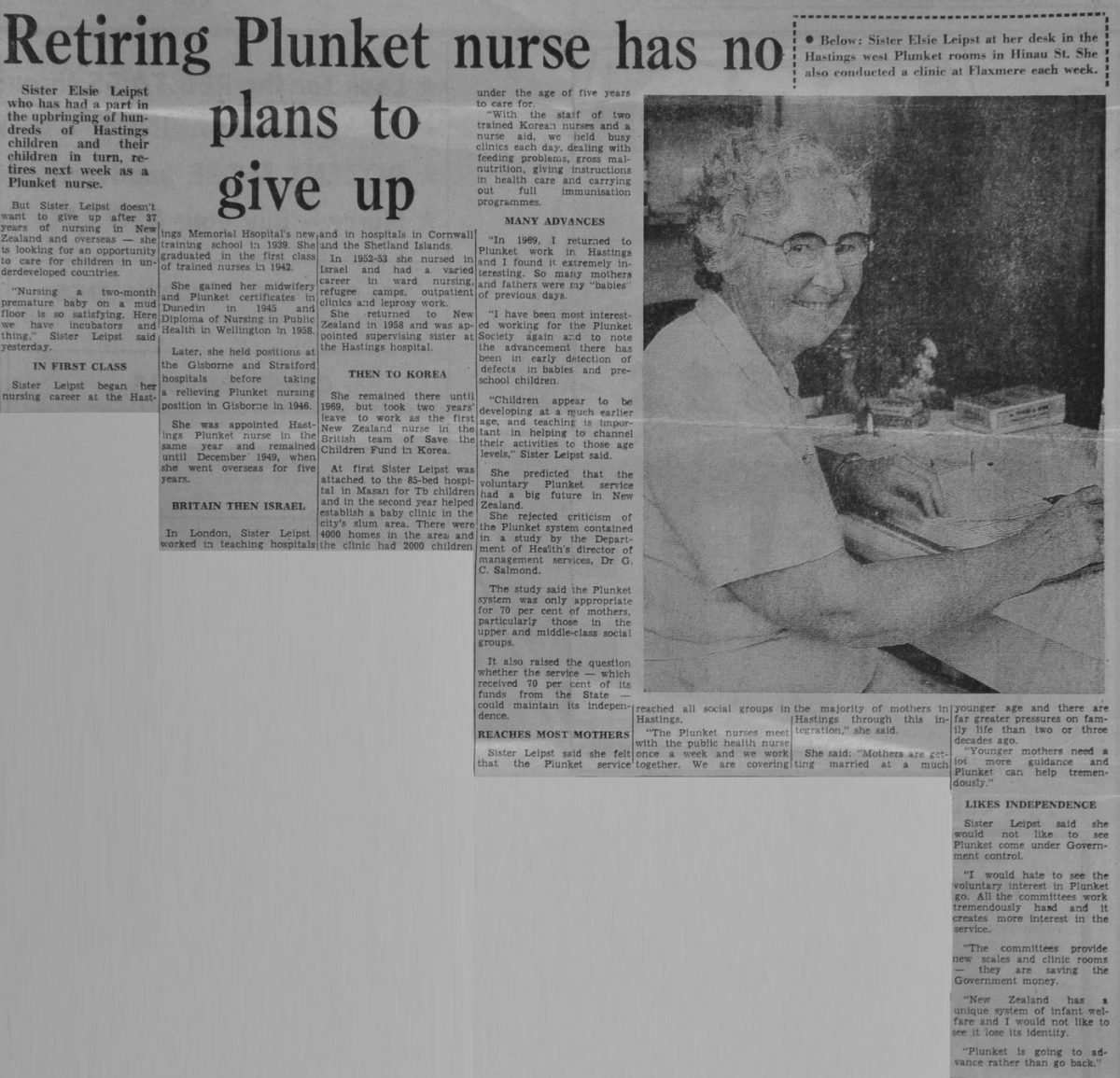Retiring Plunket nurse has no plans to give up
Sister Elsie Leipst who has had a part in the upbringing of hundreds of Hastings children and their children in turn, retires next week as a Plunket nurse.
But Sister Leipst doesn’t want to give up after 37 years of nursing in New Zealand and overseas – she is looking for an opportunity to care for children in underdeveloped countries.
“Nursing a two-month premature baby on a mud floor is so satisfying. Here we have incubators and thing.” Sister Leipst said yesterday.
IN FIRST CLASS
Sister Leipst began her nursing career at the Hastings Memorial Hospital’s new training school in 1939. She graduated in the first class of trained nurses in 1942.
She gained her midwifery and Plunket certificates in Dunedin in 1945 and Diploma of Nursing in Public Health in Wellington in 1958.
Later, she held positions at the Gisborne and Stratford hospitals before taking a relieving Plunket nursing position in Gisborne in 1946.
She was appointed Hastings Plunket nurse in the same year and remained until December 1949, when she went overseas for five years.
BRITAIN THEN ISRAEL
In London, Sister Leipst worked in teaching hospitals and in hospitals in Cornwall and the Shetland Islands.
In 1952-53 she nursed in Israel and had a varied career in ward nursing, refugee camps, outpatient clinics and leprosy work.
She returned to New Zealand in 1958 and was appointed supervising sister at the Hastings Hospital.
THEN TO KOREA
She remained there until 1969, but took two years’ leave to work as the first New Zealand nurse in the British team of Save the Children Fund in Korea. At first Sister Leipst was attached to the 85 bed hospital in Masan for Tb children and in the second year helped establish a baby clinic in the city’s slum area. There were 4000 homes in the area and the clinic had 2000 children under the age of five years to care for.
“With the staff of two trained Korean nurses and a nurse aid, we held busy clinics each day, dealing with feeding problems, gross malnutrition, giving instructions in health care and carrying out full immunisation programmes.
MANY ADVANCES
“In 1969, I returned to Plunket work in Hastings and I found it extremely interesting. So many mothers and fathers were my “babies” of previous days.
“I have been most interested working for the Plunket Society again and to note the advancement there has been in early detection of defects in babies and pre-school children.
“Children appear to be developing at a much earlier age, and teaching is important in helping to channel their activities to those age levels.” Sister Leipst said.
She predicted that the voluntary Plunket service had a big future in New Zealand.
She rejected criticism of the Plunket system contained in a study by the Department of Health’s director of management services, Dr. G. C. Salmond.
The study said the Plunket system was only appropriate for seventy per cent of mothers, particularly those in the upper and middle-class social groups.
It also raised the question whether the service – which received seventy per cent of its funds from the State – could maintain its independence.
REACHES MOST MOTHERS
Sister Leipst said she felt that the Plunket service reached all social groups in Hastings.
“The Plunket nurses meet with the public health nurse once a week and we work together. We are covering the majority of mothers in Hastings through this integration,” she said.
She said: “Mothers are getting married at a much younger age and there are far greater pressures on family life than two or three decades ago.
“Younger mothers need a lot more guidance and Plunket can help tremendously.”
LIKES INDEPENDENCE
Sister Leipst said she would not like to see Plunket come under Government control.
“I would hate to see the voluntary interest in Plunket go. All the committees work tremendously hard and it creates more interest in the service.”
“The committees provide new scales and clinic rooms – they are saving the Government money.
“New Zealand has a unique system of infant welfare and I would not like to see it lose its identity.
“Plunket is going to advance rather than go back.”
Photo caption – Below: Sister Elsie Leipst at her desk in the Hastings west Plunket rooms in Hinau St. She also conducted a clinic at Flaxmere each week.












Do you know something about this record?
Please note we cannot verify the accuracy of any information posted by the community.